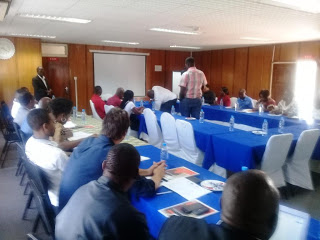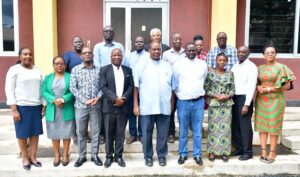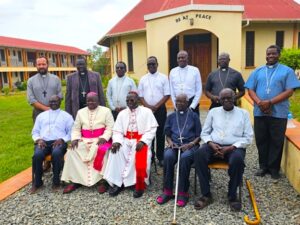ZAMBIA: CARITAS and Partners Deliberate On Local Maize Seeds’ Future

Participants of the Caritas Zambia and Participatory Ecological Land Use Management Workshop
Caritas Zambia and Participatory Ecological Land Use Management (PELUM) have co-hosted a workshop to discuss the seed sector in Zambia.
The workshop held at Zambia Conference of Catholic Bishops (ZCCB)’s Kapingila House in Lusaka from 15th, to 16th May, 2018 analysed the social, economic and political study outcome on the use of indigenous maize variety.
Speaking during the workshop, Caritas Zambia’s program officer for Livelihoods and Climate Change Adaptation Musamba Mubanga said Zambia’s maize seed industry is currently one of the strongest and most competitive cereal crops in Sub-Sahara Africa a reason why a link between the formal and informal seed systems should be established.
“There is need to establish a link between the formal and informal seed systems where both private seed enterprises and public institutions have to play an active role in the preservation of local seed variety that is threatened with extinction,” she said.
Ms. Musamba explained that the preservation of local seed variety will help in food security because it is adaptive to climate change unlike the hybrid.
She revealed that the workshop recommended that in order to ensure that seed enterprises are responding to the farmers needs, Government should consider regaining control of such schemes.
“Government could for example throw a majority of shares in the enterprises. These enterprises would be structured in a way that farmers participate, encourage seed diversity, food and nutrition security as well as reduce monopoly by multinationals. This is important in developing seeds based on the diverse conditions and needs of small scale farmers, reducing poverty and creating employment, which according to the findings is not being realized within the seed sector,” she disclosed.
Participants at the workshop recommended to government to provide incentives to local seed companies promoting traditional and indigenous seed that wish to venture into the seed sector to enable farmers participate in the seed sector and enhance indigenous crop diversity for food security.
Other recommendations were that government take deliberate steps to ensure transparency in all business operations in the seed sector; to invest more in the creation of markets of diverse crops which may perform better than maize, such as small grains like millet and sorghum, and traditional vegetables; and carrying out research in order to establish the effectiveness of government in regulating and monitoring the seed sector in Zambia.
The workshop attracted 36 participants from Academia, Government departments, Civil Society Organisations, Private sector and farmers.
∽End∽
By Mwenya Mukuka, ZCCB Communications Officer


